On Monday, October 26, the American Studies program will devote an evening to pondering the imminent American election. All are welcome. We look forward to a lively discussion with students and alumni. Sign up for the Zoom webinar here.

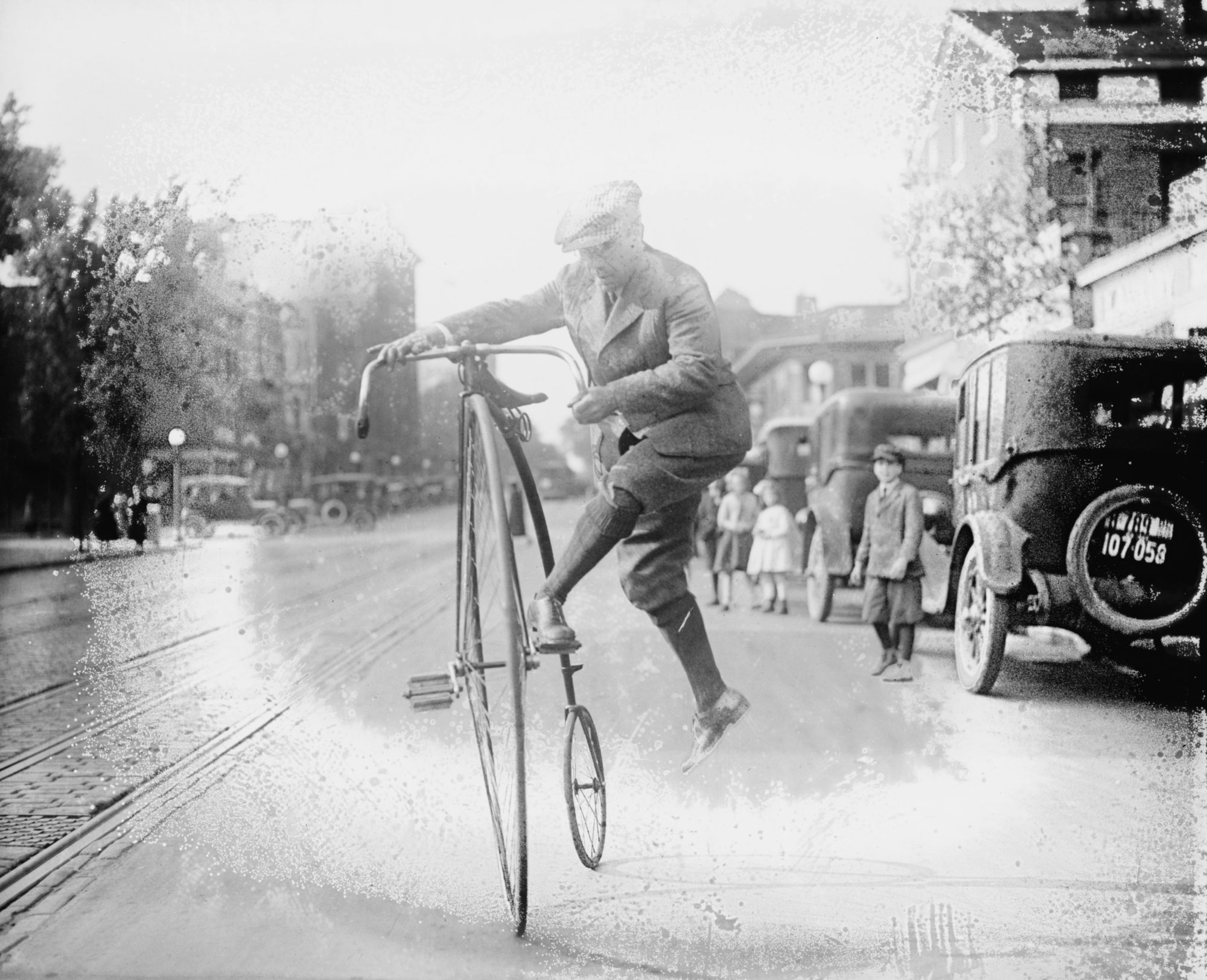
University of Amsterdam
On Monday, October 26, the American Studies program will devote an evening to pondering the imminent American election. All are welcome. We look forward to a lively discussion with students and alumni. Sign up for the Zoom webinar here.

On August 28, the UvA American Studies program’s Manon Parry was a guest on the FiveThirtyEight podcast, to discuss governmental responses to COVID-19 in the Netherlands and the United States. The conversation is wide-ranging: from Dutch refrains of an “intelligent lockdown” to American refrains of “individualism,” from mask mandates (and the inconsistencies thereof) to the reactions against governmental policies in both contexts.
The conversation arrives at profound questions: on the politics of austerity and end-of-life care, and what is hidden by the stories we tell about “national character.”
The interview with Parry begins in the podcast’s second half.
Just Because We Can Get Reinfected With COVID-19 Doesn’t Mean We Can’t Beat It
In 1917, Max Weber said, about the United States, that “it is often possible to see things in their purest form there.” He was talking then about scholarship as a vocation (“Wissenschaft als Beruf“), reflecting on the “Americanization” of German academic life, but it was a broader theme running through his work.
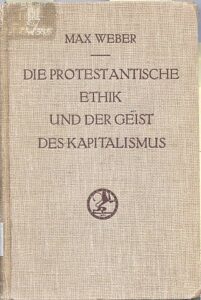 “America Inside Out” is an MA seminar in our program about international perspectives of the United States. Among its texts is Weber’s The Protestant Ethic and the Spirit of Capitalism (1904-1905). That book grew out of a trip to the U.S. in 1904, where, as the American Studies program’s George Blaustein writes in the New Republic, Weber “faced the lurid enormity of capitalism.” Looking upon Chicago (the focus of the BA course Metropolitan America), with its slaughterhouses, the strikes, the multi-ethnic working classes, Weber felt he was looking at “a man whose skin has been peeled off and whose intestines are seen at work.”
“America Inside Out” is an MA seminar in our program about international perspectives of the United States. Among its texts is Weber’s The Protestant Ethic and the Spirit of Capitalism (1904-1905). That book grew out of a trip to the U.S. in 1904, where, as the American Studies program’s George Blaustein writes in the New Republic, Weber “faced the lurid enormity of capitalism.” Looking upon Chicago (the focus of the BA course Metropolitan America), with its slaughterhouses, the strikes, the multi-ethnic working classes, Weber felt he was looking at “a man whose skin has been peeled off and whose intestines are seen at work.”
Weber theorized the rise of capitalism, the state and its relationship to violence, the role of “charisma” in politics. Again and again he returned, as we still do, to the vocation—the calling—as both a crushing predicament and a noble aspiration. He died 100 years ago, in a later wave of the Spanish flu. It is poignant to read him now, in our own era of pandemic and cataclysm. It might offer consolation. Or it might fail to console.
Read those reflections on the relevance and irrelevance of Weber’s writings in an era of pandemic and political upheaval here: “Searching for Consolation in Max Weber’s Work Ethic,” The New Republic (July 2, 2020). Read them in Dutch translation here: “De onttovenaar van de wereld,” De Groene Amsterdammer 144:25 (June 17, 2020), p. 36-41.
The murder of George Floyd and the global protests that have followed in its wake have occasioned statements of solidarity from American Studies associations worldwide. The structures of racism and police violence are, after all, longstanding subjects of Americanist academic inquiry. The statement of the Netherlands American Studies Association is worth posting in full here, too.
Recent American demonstrations against racist police violence have been met with yet more police violence and with militaristic brutality. The Netherlands American Studies Association condemns this violence and applauds the uprising against it.
We study American history, literature, politics, and culture. We teach our students to think about systems, voices, and form. For the most part we do so from afar. But that endeavor resonates abroad: whatever “America” is has implications, at least somewhere down the line of inquiry and interpretation, for who and what we are, where we are.
Due to the pandemic, NASA has had to cancel its annual Amerikanistendag this year. In light of ongoing events, and in solidarity with anti-racist struggles in the United States and Europe, we have redirected the funds we would have spent on that event toward two organizations, one in the U.S. and one in the Netherlands.
The Bail Project is an American bail fund dedicated to fighting mass incarceration. Controle Alt Delete is an organization dedicated to ending ethnic profiling by Dutch police, and to racial justice in the Netherlands more broadly.
We believe this gesture is in keeping with our scholarly commitments.
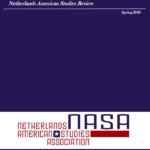 The Netherlands American Studies Association is proud to announce a new venture: The Netherlands American Studies Review, a bi-annual journal founded, as the editors note, “to promote and celebrate student excellence in the field of North American Studies nationwide, including – but not limited to – history, politics, literature, and society.” The inaugural issue casts transatlantic and hemispheric nets, with articles on modern climate politics, on the American West in recent literature film, on the American West in video games, on the novels and journalism of the Ciudad Juárez femicides, and more.
The Netherlands American Studies Association is proud to announce a new venture: The Netherlands American Studies Review, a bi-annual journal founded, as the editors note, “to promote and celebrate student excellence in the field of North American Studies nationwide, including – but not limited to – history, politics, literature, and society.” The inaugural issue casts transatlantic and hemispheric nets, with articles on modern climate politics, on the American West in recent literature film, on the American West in video games, on the novels and journalism of the Ciudad Juárez femicides, and more.
Two contributions come from the University of Amsterdam. Job Wester, in “The Land of Cars, Crime, and Capitalism: The European Imagination of the United States in Hergé’s Tintin in America,” charts the making and remaking of Tintin through the mid-twentieth century, thus to illuminate “the Belgian imagination of American society in the 1930s through the looking glass of a conservative Catholic newspaper comic.” Among other lively details, Wester notes Hergé’s satire of American religion “as advertised on the streets of Chicago: ‘Profit from our new religion! Join the Brothers of Neo-judeo-buddho-islamo-americanism, and earn the highest dividends in the world.’ Capitalism as religion, money as sacred, Hergé indulged his smug European Catholic readers with tales of a depraved American society.”
Melle van Dammen’s contribution is another transatlantic illumination. Edward Bellamy’s Looking Backward, the American utopian novel from 1887, van Dammen shows, has had a curious legacy in Dutch politics and culture. The novel was first translated in 1890, as In het Jaar 2000, by Frank van der Goes, who would later be among the founders of the Sociaal-Democratische Arbeiderspartij. In the 1930s, the Internationale Vereniging Bellamy revived him yet again, in a liberal mode; the IVB was at first tolerated in the Nazi occupation but eventually crushed. Its postwar iteration, Nederlandsche Bellamy Partij, would eventually fold into the constellation that became GroenLinks. “Looking Backward was, in the end, a rather conservative middle-class fantasy that was never able to find broad support among the working classes,” van Dammen notes, making its regular cameos in the career of Dutch social democracy all the more remarkable.
This undertaking began months ago; it represents the long work of writing and rewriting, editing and re-editing. The Editorial Committee consists of Debby Esmeé de Vlugt (editor-in-chief), Celia Nijdam, Heleen Blommers, Loïs Machelessen, and Esther Baar.
That it has been completed and launched now, in this terrible moment, makes it not merely a showcase of student work but an expression of intellectual community. We look forward to more.
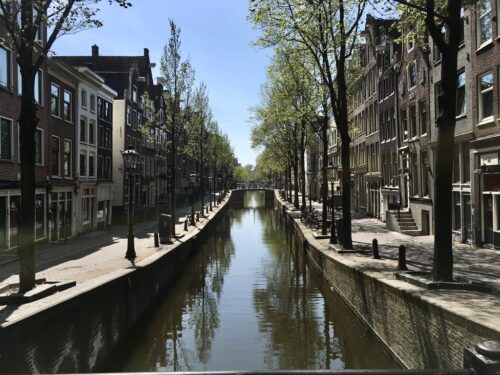
American Studies alumnus Tim Igor Snijder’s article in the Washington Post (May 6, 2020) explores the effect of coronavirus on Amsterdam and tourism.
Beginning in mid-March, when the Netherlands went into semi-lockdown to combat the covid-19 pandemic, tourism vanished from Amsterdam almost overnight. A social and economic crisis has hit the country and its capital hard. But for residents of Amsterdam’s historic city center, there is a clear silver lining: temporary relief from the burden of overtourism.
He captures the eerie calm of walking through the Red Light District these days. “The total quiet of the Wallen,” as the University of Amsterdam’s Tim Verlaan observes in the article, “shows exactly how geared toward tourism that neighborhood has become. There are no shops left to serve residents.”
Read the whole thing here: “‘The city is ours again’: How the pandemic relieved Amsterdam of overtourism,” Washington Post (May 6, 2020)
The American Studies program’s Manon Parry is also Professor of Medical History at the Vrije Universiteit Amsterdam. Starting in February 2020, she has taught the Introduction to Medical and Health Humanities. It was clear then that coronavirus would became “a topic we could not ignore in our class,” she noted. Her course materials and her writings about the pandemic are available on the website of the PULSE Network, for medical and health humanities.
Course materials of interest to Americanists include the historian Nancy Tomes’s account of the influenza pandemic, and her history of US health care debates:
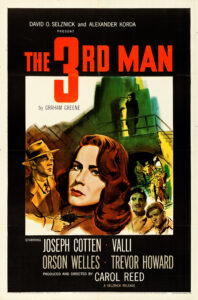
We often treat jazz like an old painting, a precious object to be handled with care. But what of jazz’s present, and its future? We are living in jazz’s second century, and it is a golden age. In Playing Changes: Jazz for the New Century, the acclaimed critic and journalist Nate Chinen has chronicled jazz in our time.
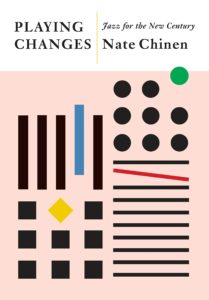
Playing Changes: Jazz for the New Century
A book presentation and interview with Nate Chinen
Sunday, October 13, 2019, 2-3:30pm
Bimhuis
Piet Heinkade 3, 1019 BR Amsterdam
Named one of the best books of 2018 by NPR, GQ, Billboard and JazzTimes, Playing Changes is the definitive guide to jazz now, and a musical history of the present. “Whatever you choose to call the music, ‘jazz’ is as volatile and generative now as at any time since its beginnings.” In jazz parlance, “playing changes” has long referred to an improviser’s resourceful path through a chord progression. Playing Changes expands on that idea, following the musicians and the music through the many ideological, technological, theoretical, and practical changes that jazz has seen. The book’s musical cast is broad and multi-generational, from Wayne Shorter to Brad Mehldau to Esperanza Spalding. The music in it is alive. Chinen traces the influence of jazz education; considers a globalized jazz ecology; and explores the pollination between jazz and other musics, like hip-hop and R&B.
Join us at the Bimhuis for an afternoon with Nate Chinen, a former critic for The New York Times. He will read from the book, with musical illustration, and discuss its themes with moderator George Blaustein.
This event is sponsored by the Bimhuis, the John Adams Institute, and the Netherlands American Studies Association (NASA).
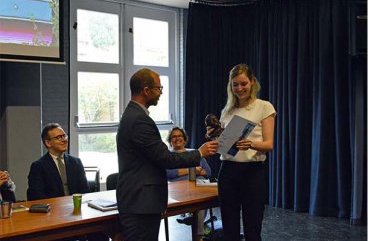
American Studies graduate Queeny van der Spek has won the 2019 Theodore Roosevelt American History Award (TRAHA). The prize was awarded at the Netherlands American Studies Association’s Amerikanistendag, in Groningen on June 7. The TRAHA winner receives, among other things, a trip to Teddy Roosevelt’s old ranching grounds of North Dakota.
Van der Spek’s thesis, “Hitler’s Gift to America: American motivations to rescue displaced scientists from Europe in the 1930s,” is an account of the actions undertaken by governments, universities, and philanthropic organizations in the United States to aid scientists from Nazi-dominated Europe. She wound together the history of immigration and refugee policy with the history of science. As the jury noted in its report, the thesis “scrupulously explores the reasons underlying American national interest in rescuing displaced European scientists and offers fresh insights into the story of American interwar refugee policies.” Van der Spek “makes a substantial contribution to the existing debate about US’s responsibilities over the fate of European Jews and pinpoints the correlation between science and politics, which rests at the center of her intellectually engaging and historically revealing analysis.”
The TRAHA jury also gave special honorary mention to American Studies graduate Lennart Bolwijn, for his thesis, “Dogma, Romance, and Double-Consciousness: The Dilemmas of the New Negro Generation Through the Travels of Otto Huiswoud and Claude McKay.” Bolwijn followed the Jamaican-born writer Claude McKay and the Suriname-born political activist Otto Huiswoud through Harlem, Jamaica, Suriname, and Moscow, and traced the surprising intellectual orbits of the Harlem Renaissance, black nationalism, and communism. The jury noted the thesis’s “surprisingly large terrain,” and its laudable use of primary sources from the Black Archives in Amsterdam.
Both theses are to be applauded for their ambitious international scope and their archival detail. Queeny and Lennart have done the program proud.
Other recent graduates of the American Studies MA program who have won the award are Renee de Groot (2017) and Martina van Cimmenaede (2016). The prize jury has also given honorable mentions to graduates Roos Maier (2016) and Elisabeth Koning (2014).
The full jury report can be read here.